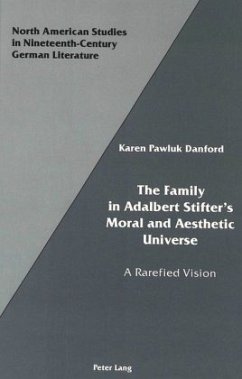This study focuses on the role of the family in European bourgeois society and literature in the 19th century through the works of Adalbert Stifter (1805-1868). The traditional patriarchal family was undergoing a crisis arising from the very principles of commercial society, while the emerging middle-classes idealized familiar piety as part of its liberal ideology. Socialist thinkers also attacked the family for its connection to private property and inherent tension with universal humanism. Stifter struggled with the negative and positive aspects of the family in his social essays and the Studien and Bunte Steine collections. In his greatest work, Der Nachsommer , he asserts the importance of the family for individual happiness and social cohesion, but at some cost, since the enlightened, aestheticized world he presents there rests on a such rarefied vision of human nature.
"Danford analyzes the idea, the symbolic role, and the contextual situation of the family in Stifter's major writings...in an illuminating and balanced way...There are excellent sections on Stifter's 1848 shock and his hopes projected on the healing institution of the family...I find her interpretation of 'Hochwald' and 'Turmalin' truly innovative...and her final evaluation of 'Nachsommer' fully indicative of the fairness of her critical mind." (Peter Demetz, Yale University)
"Karen Danford wisely decided to orient her study of the role of the family in Stifter's major works towards social history rather than psychology. This allows her to view Stifter illuminatingly not only against a decisively changing historical background, but also in the rich context of other preceding and contemporary approaches to the concept of family (most notably those of Hegel and Engels). Throughout she maintains a productive and mature balance of judgment pertaining to the potential role of the family as well as to Stifter's achievements and limitations as a writer." (Ingeborg Glier, Yale University)
"Karen Danford wisely decided to orient her study of the role of the family in Stifter's major works towards social history rather than psychology. This allows her to view Stifter illuminatingly not only against a decisively changing historical background, but also in the rich context of other preceding and contemporary approaches to the concept of family (most notably those of Hegel and Engels). Throughout she maintains a productive and mature balance of judgment pertaining to the potential role of the family as well as to Stifter's achievements and limitations as a writer." (Ingeborg Glier, Yale University)
